Hibiscus Tea Benefits: 11 Proven Ways To Boost Your Health
A vibrantly colored drink that is not only delicious but also loaded with antioxidants.
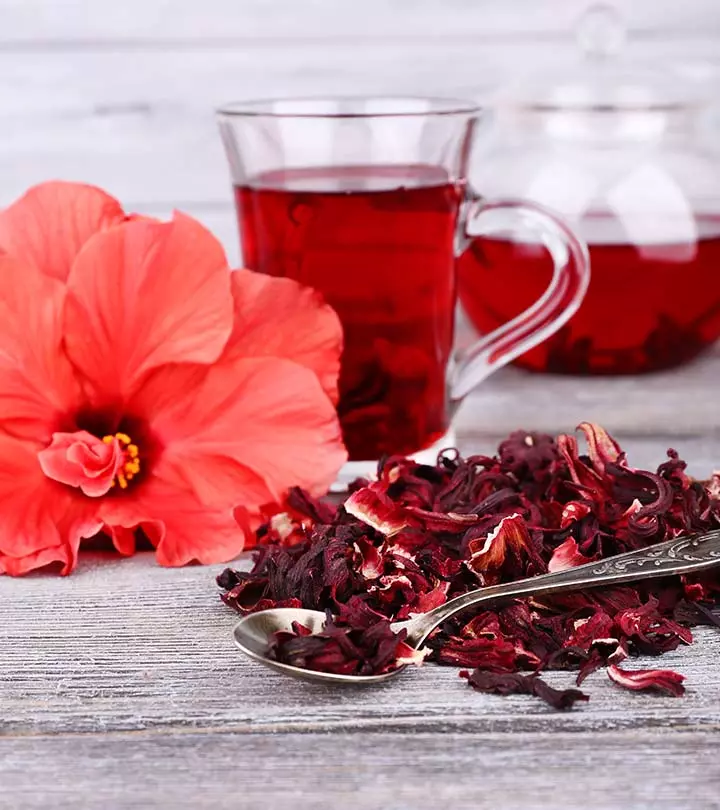
Image: Shutterstock
Hibiscus tea benefits are numerous and are gaining the attention of many health enthusiasts. The tea is made by brewing the dried petals of hibiscus flowers. You can also make this tea by infusing hibiscus leaves in water.
However, the tea made with petals is known to offer many benefits. It can heal wounds (1). Some also claim that this tea enhances hair health, promotes weight loss, and helps manage diabetes.
Continue reading to learn about the many hibiscus tea benefits and how to make it at home.
 Know Your Ingredient: Hibiscus Tea
Know Your Ingredient: Hibiscus TeaWhat Is It?
A herbal tea prepared by boiling parts of the Hibiscus plant in water.
What Are Its Benefits?
It aids in weight loss, enhances skin health, promotes natural hair growth, and much more.
Who Can Consume It?
It can be consumed by most adults except those who are allergic to it or have low or high blood pressure issues.
How Often?
Around 2-4 cups in a day
Caution
Avoid hibiscus tea if you are allergic to it or face blood pressure issues. Some common side effects might include stomach pain and constipation.
In This Article
11 Health Benefits Of Hibiscus Tea
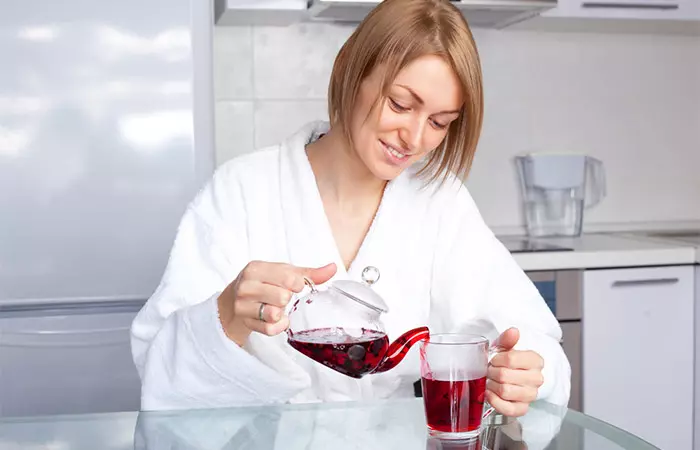
Research proves the ability of hibiscus tea to control hypertension. It is said to have diuretic and antidepressant properties. Hibiscus flowers are also effective laxatives and liver-friendly.
1. May Help Treat Skin Ailments
Using hibiscus for skin is a common practice, but even hibiscus tea may help keep your skin healthy. It promotes wound healing and treat other forms of skin ailments.
In rat studies, extracts of hibiscus were found to have a better wound healing property than a popular topical ointment (1). The hibiscus flower extract could effectively be used for improving skin hydration and treating topical wounds.
In the study, the hibiscus extract could improve wound contraction and closure (1).
Topical application of the extracts of another species of hibiscus could also help treat herpes zoster (a viral infection characterized by painful rashes and blisters) (2).
Betty, a vlogger focusing on skincare and natural remedies, tried drinking hibiscus tea for a week as a skincare challenge. Speaking of the results, at the 6 day mark, she provides a skin update, mentioning, “I found out that the little inflammations I had on my skin are clearing up… and my skin has this amazing glow to it, although I still have some bumps left on my skin.” Finally, after a week of the regimen, she shared her final verdict, “This tea has been so good to my body, not only my face, it has really worked well for my gut and also for my bowel movement, and has really helped me in losing weight…. When it detoxes your system, it shows on your skin (i).”
2. May Aid Weight Loss
A species of hibiscus could help reduce obesity in animal studies.
Treatment with the extract could improve obesity induced by a high-fat diet. The hibiscus extracts were rich in polyphenols and flavonoids, which helped reduce obesity parameters (3).
The water extract of hibiscus reduces the levels of serum triglycerides and total cholesterol. It does so by inhibiting the lipid absorption in the gut (3).
As a part of lab trials, human subjects were given about 100 mg/day of hibiscus extract powder for 1 month. The patients showed significantly reduced levels of triglyceridesi A significant component of body fat in the human body. Large amounts of it can lead to stroke and other heart disorders. and total cholesterol and an increase in the levels of HDL or good cholesterol (4).
A specific species of hibiscus was found to reduce abdominal fat. The extract reduced obesity markers and levels of free fatty acids in the subjects (5).
 Trivia
Trivia3. May Promote Hair Growth
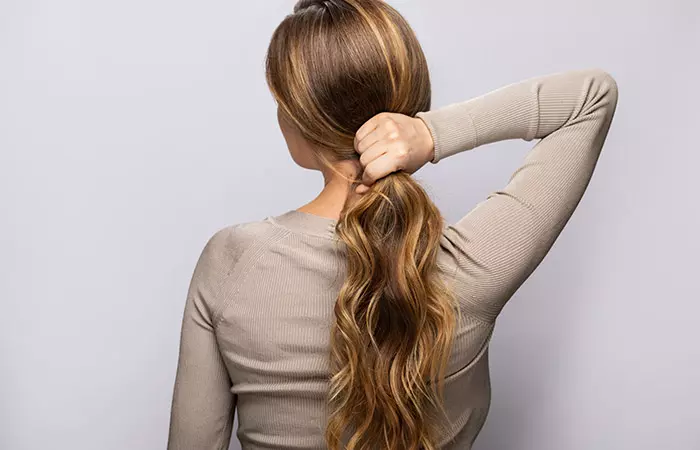
Flowers of the Hibiscus genus are popularly used for achieving long, shiny tresses. Some rat studies demonstrate the hair growth-stimulating properties of the leaf extracts of the hibiscus plant (6).
Using hibiscus for your hair can be beneficial, as shown in a Palestinian study where the flower of a species of hibiscus was found to promote hair and scalp health. Soaking the flower in warm water and then applying to hair (which is how hibiscus tea is prepared) may improve the health of the scalp and hair (7).
The exact mechanism of this method is yet to be understood. Information is also lacking if other species of hibiscus found in other parts of the world may have similar effects. There is not enough research to understand the action of hibiscus tea on hair growth.
4. May Help Manage Diabetes
A particular species of hibiscus may help treat diabetes and improve insulin sensitivity.
The petals of Hibiscus sabdariffa (another species of hibiscus) have phytochemicalsi A chemical compound present in fruits and vegetables that helps fight bacteria and fungal infections. like cyanidin 3, rutinocod, delphinidin, galactose, hibcitin, ascorbici A vitamin that plays a vital role in preventing infections, healing wounds, and supporting the immune system. acid, citric acid, anthocyanins, beta-carotene, and sitosterol.
In studies, an infusion of this hibiscus tea, thrice a day for four weeks, was found to have a positive effect on type 2 diabetes. Also, this tea improved the functioning of pancreatic beta-cells (8).
Oxidative stress is a leading cause of diabetes mellitus. Hibiscus tea may help decrease oxidative stress and exhibit anti-diabetic properties.
In a study, diabetes-induced rats were orally given Hibiscus taiwanensis (another species of hibiscus) extracts thrice a day for three days. Scientists reported an increase in insulin sensitivity (9).
5. May Lower Cholesterol Levels
There is increasing evidence that drinking hibiscus tea may have cholesterol-lowering effects.
Hibiscus, in general, contains polyphenolic acids, flavonoids, and anthocyanins. These compounds show antioxidant activity. The tea may have positive effects on cholesterol levels.
Studies show that the flower may be used in future studies for the prevention and treatment of high cholesterol in adolescents (10).
A study on 43 adults (30-60 years old) with high cholesterol was conducted. The test group was given two cups of hibiscus tea for 12 weeks. Results showed a mean reduction in total cholesterol by 9.46%, HDL by 8.33%, and LDL by 9.80%. The study states that hibiscus tea may have a significant positive effect on blood cholesterol levels (11).
Unlike other lipid-lowering agents, hibiscus tea may not cause any electrolyte disturbances. Hence, its intake with fixed dietary patterns and physical activity may have positive effects on cholesterol levels. However, the conclusion needs further studies (12).
6. May Protect The Heart From Disease
Having hibiscus tea or flower extract may significantly lower systolic blood pressure (SBP) and diastolic blood pressure (DBP) in adults, contributing to heart health.
According to a 2008 study, volunteers who drank hibiscus tea had a 7.2 point drop in their systolic blood pressure, compared to a 1.3 point drop in those consuming placebo. The tea has great potential to reduce the risk of cardiovascular disease and needs further studies to back it up (13).
Several controlled trials show that hibiscus tea has lipid-lowering effects. A review reports on randomized controlled trials that used hibiscus as an intervention for lipid profiles, blood pressure (BP), and fasting plasma glucose levels in adults, and 17 chronic trials were included in the data extraction. The results of the meta-analysis suggest that consuming hibiscus regularly may lower the risk of cardiovascular disease, with hibiscus exerting stronger effects on systolic BP (−7.10 mmHg) and lowering levels of low-density lipoprotein to −6.76 mg/dL. The anthocyanins in the flower are considered responsible for this characteristic (13).
Preventing the formation of these lipid-oxidized plaques can prevent cardiovascular diseases like atherosclerosis. However, research is ongoing to study the precise mechanism of cardioprotection by hibiscus tea. Also, the active ingredients behind this activity are yet to be identified (13).
7. May Prevent Liver Damage
Controlled trials report that hibiscus extracts can reduce fat accumulation in the livers of hamsters on a high-fat diet. Administering this extract lowered liver cholesterol and triglyceride levels (3).
A high-fat diet also elevates levels of a couple of enzymes, namely serum alanine aminotransferase and aspartate aminotransferase. These increase the risk of liver damage. Treatment with hibiscus extracts was found to lower the levels of these enzymes (3).
Also, the extracts could restore the levels of antioxidant enzymes like catalase and superoxide dismutase in the liver. This may further promote liver health (14).
8. May Relieve Anxiety And Promote Sleep
Hibiscus extracts (of another species of the same plant) have shown to have sedative and anxiety-reducing effects on mice. In mice studies, these showed more pronounced effects with repeated doses of the extracts (15).
Hibiscus extracts may also relieve pain, fever, and headache. However, there is limited information in this regard.
9. Could Help Fight Viral And Bacterial Infections
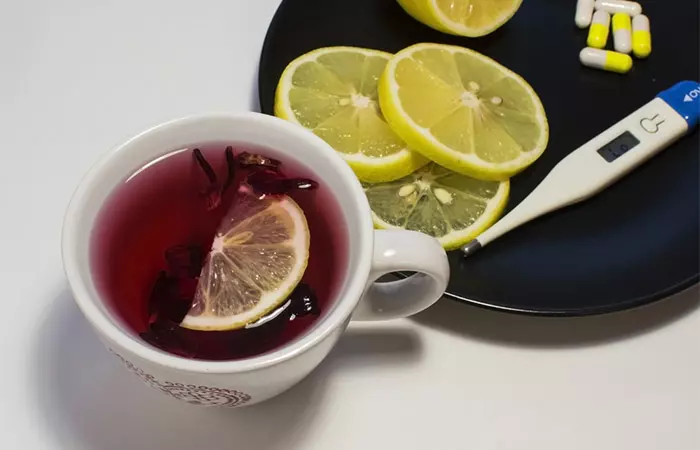
Drinking hibiscus tea may not only help you recover from cold and flu but also fight the influenza virus to delay the next bout. Studies state that hibiscus could be a promising anti-influenza drug (16).
Hibiscus tea extract is a natural remedy that can help fight the avian influenza virus and several drug-resistant viruses. In laboratory experiments, among 11 tea extracts, this tea showed the most potent antiviral property (16).
Hibiscus is rich in anthocyanins. It is proposed that the antiviral effect is derived from these compounds (16).
10. May Have Antidepressant Effects
The flavonoids in hibiscus (Hibiscus rosa-sinensis Linn.) have antidepressant effects. These work on the release of dopamine and serotonin (the happiness hormones), thereby helping lower the symptoms of depression (17).
Alcohol extracts of another species of hibiscus could also show antidepressant-like activity on postpartum disorders. Postpartum depression in mothers has a significant effect on the cognitive and emotional development of children (18).
The hibiscus extract was found to inhibit the enzymes that inactivate dopamine and serotonin. This could indirectly aid the treatment of postpartum depression (18).
However, more research is warranted. Also, the safety of hibiscus tea during pregnancy is not known. Hence, please consult with your doctor in this regard.
11. May Help Prevent Cancer
The polyphenols in hibiscus flowers are proven antioxidants. A few also possess anti-tumor or anti-cancer properties.
The extracts rich in polyphenols can induce cell death (apoptosis) in a variety of cancer cells, including gastric and breast cancers (19), (20).
In the breast cancer study, the triterpenoids in hibiscus affected only malignant cells and not the surrounding healthy cells (20).
These active biomolecules cause DNA fragmentation in the target cancer cell after 24 hour-treatment with hibiscus extract (19).
However, these are test-tube studies. Further research on humans is needed to identify the hibiscus compounds that possess such anticancer properties.
But to give you a clearer and bigger picture, we will discuss the phytochemical profile of hibiscus flowers. Since the same flowers go into making the tea, let’s look at the nutritional profile of hibiscus tea too.
Key Takeaways
- Hibiscus tea can help heal wounds and offer treatment for skin issues.
- Drinking hibiscus tea regularly can reduce hypertension.
- It can help relax you during a viral cold or flu and boost your immune system.
- If you feel stressed or anxious, try drinking hibiscus tea as it has antidepressant properties to help you feel better.
Nutritional And Phytochemical Composition* Of Hibiscus Tea
| Nutritional value for 8.0 fl oz or 237 g | |||
| Nutrient | Units | Quantity | |
|---|---|---|---|
| Water | g | 236.00 | |
| Ash | g | 1.00 | |
| Minerals | |||
| Calcium, Ca | mg | 19 | |
| Iron, Fe | mg | 0.19 | |
| Magnesium, Mg | mg | 7 | |
| Phosphorus, P | mg | 2 | |
| Potassium, K | mg | 47 | |
| Sodium, Na | mg | 9 | |
| Zinc, Zn | mg | 0.09 | |
| Manganese, Mn | mg | 1.130 | |
| Vitamins | |||
| Niacin | mg | 0.095 | |
| Folate, total | µg | 2 | |
| Folate, food | µg | 2 | |
| Folate, DFE | µg | 2 | |
| Choline, total | mg | 0.9 | |
*values sourced from USDA, Beverages, tea, hibiscus, brewed
- Hibiscus flowers have different types of phytochemicals, like organic acids, anthocyanins, flavonoids, and glycosides.
- Delphinidin-3-sambubioside, delphidin, and cyanidin-3-sambubioside are the predominant anthocyanins.
- Phenolic acids include protocatechuic acid, catechin, gallocatechins, caffeic acid, and gallocatechin gallates (13).
- Researchers also isolated aglycones like hibiscetrin, gossypitrin, sabdaritrin, quercetin, luteolin, myricetin, hibiscetin.
- Sterols, including eugenol, β-sitosterol, and ergosterol were also recorded (21).
- These phytochemicals act in synergy to improve your heart and liver health, hair color, and state of mood.
Hibiscus contains powerful compounds called polyphenols and flavonoids, which are known for their antioxidant properties. These antioxidants help protect the body from harmful free radicals that can cause damage to cells and lead to various diseases. By fighting off these free radicals, hibiscus can support overall health and may reduce the risk of chronic conditions like heart disease and certain cancers (22). Incorporating hibiscus into your diet can be a tasty way to boost your health and strengthen your immune system.
In the following section, we have discussed how you can make this caffeine-free, herbal tea right at your home.
How To Make Hibiscus Tea
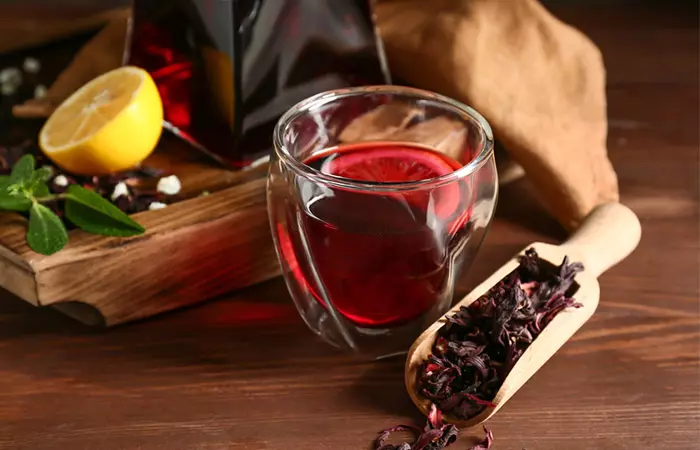
We have the recipes for both hot and cold hibiscus tea/drink.
1. Hot Brew Hibiscus Tea
What You Need
- Dried hibiscus flowers: 2 teaspoons
- Water: 3-4 cups
- Boiling pot
- Cinnamon stick (optional)
- Mint leaves (optional)
- Lime wedge (optional)
- Honey, sugar, or sweetener of choice (to taste)
Let’s Make It!
- Set a pot of water to boil.
- Add the dried hibiscus flowers to an empty, clean teapot.
- Pour the boiling water into the teapot.
- Let the tea steep for about 5 minutes. The tea will start to become intense and red. You may steep it longer for a deeper/stronger taste.
- Strain the contents to get rid of the flowers.
- Add a sweetener of your choice. Drinking it unsweetened is even better.
- Serve it hot with a garnish of cinnamon, mint leaves, and a lemon wedge.
2. Iced Hibiscus Tea
You will need the same ingredients for making this version of hibiscus tea except for a pitcher. All you need to do is:
- Add the hibiscus flowers/powder and water to a pitcher. Stir well.
- Refrigerate the mix overnight (or for 8-12 hours) to steep the flavors well.
- You can cover the pitcher with its lid or a foil.
- Take it out of the fridge once the flavor and color have developed.
- Strain the contents into serving glasses.
- You may add the sweetener in this step.
- Serve chilled with ice with a garnish of cinnamon, lime, and mint leaves.
Having a cup of hibiscus tea two times a day could be ideal. There is no information available on the recommended dosage.
If you want to use dried hibiscus powder, about 250 mg a day should do.
You can also try the alcohol-free tincture of hibiscus flowers.
All these forms of hibiscus are equally effective. But hibiscus tea is the best of all.
 Quick Tip
Quick TipHibiscus tea is a delicious and nutritious beverage that you can include in your diet. But what is the best time to drink it? Find out in the next section.
What Is The Best Time To Drink Hibiscus Tea?
There is no specific ideal time to drink hibiscus tea. When you want to consume it depends on your personal preferences. Some consume it at night due to its calming, sleep-promoting qualities as it lacks caffeine. On the other hand, others may like to start their day with this refreshing drink. However, avoid consuming it on an empty stomach right in the morning as it may cause acidity and digestive discomfort. The key is to enjoy the tea as per your taste and daily routine.
But what happens if you drink more than two to three cups of this tea? Also, can everybody drink hibiscus tea? Are there any restrictions on having this beverage? In the following section, we have discussed the possible side effects this tea can cause.
Side Effects And Risks Of Hibiscus Tea

There are a few documented side effects of having hibiscus tea, including herb-drug interactions.
- Hibiscus roots exert an antifertility and uterotrophic effect. They may have estrogenic activity on your body and prevent fetal implantation or conception (23).
- The polyphenols in hibiscus tea might increase the body’s burden of aluminum. High urinary excretion of aluminum was observed days after consuming hot hibiscus tea. Hence, pregnant women and people with kidney stones should be cautious about an overdose (24).
- Hibiscus sabdariffa L. decoctions have shown herb-drug interaction with the diuretic medication, hydrochlorothiazide (HCT). They also interfere with the activity cytochrome P450 (CYP) complex. These CYP complexes are responsible for the metabolism of several prescribed drugs. Whether they have fatal effects or not needs to be studied further (25), (26).
- Some evidence suggests that hibiscus tea may also lower blood pressure (13). Though there is no direct evidence that the tea may interfere with medications for treating high blood pressure, those on the same would need to check with their doctor before consuming hibiscus tea.
Infographic: 5 Ways Hibiscus Tea Benefits Your Health
Switch your regular tea with a refreshing cup of hibiscus tea. This herbal beverage is popular due to its ability to boost hair and skin health. It is also a rave amongst fitness enthusiasts for its weight loss benefits. The infographic below lists five reasons for adding hibiscus tea to your diet. Check it out!
Some thing wrong with infographic shortcode. please verify shortcode syntaxHibiscus tea is an herbal beverage with a tart flavor and many medicinal properties. The rich nutritional and phytochemical compounds in hibiscus tea benefit your health in many ways. The tea may help treat skin issues and enhance skin health, aid in weight loss, improve digestion, promote hair growth, help manage diabetes, lower cholesterol levels, protect the heart, and improve liver and kidney health. You can prepare this herbal tea in both hot and cold forms. However, it may interact with certain drugs, and its excess intake may also prevent fetal implantation. In addition, people with kidney stones and pregnant women should check for the right dose before taking the tea.
Frequently Asked Questions
What is the best time of day to drink hibiscus tea?
Hibiscus tea is known for its sleep-promoting qualities, so its best to consume at night. Avoid drinking hibiscus tea on an empty stomach early in the morning as it may cause acid buildup.
Is hibiscus tea better hot or cold?
Hibiscus tea is tart and delicious, whether served hot or chilled. Neither heating nor refrigerating affects the nutrient profile of hibiscus tea.
Is hibiscus tea anti-inflammatory?
Yes, hibiscus tea has anti-inflammatory properties that combat inflammation in the body owing to the polyphenols it contains (25).
Does hibiscus tea have more antioxidants than green tea?
Yes, comparative research suggests that hibiscus tea has more antioxidants than green tea (26).
Illustration: Hibiscus Tea: Benefits, How To Make, Side Effects
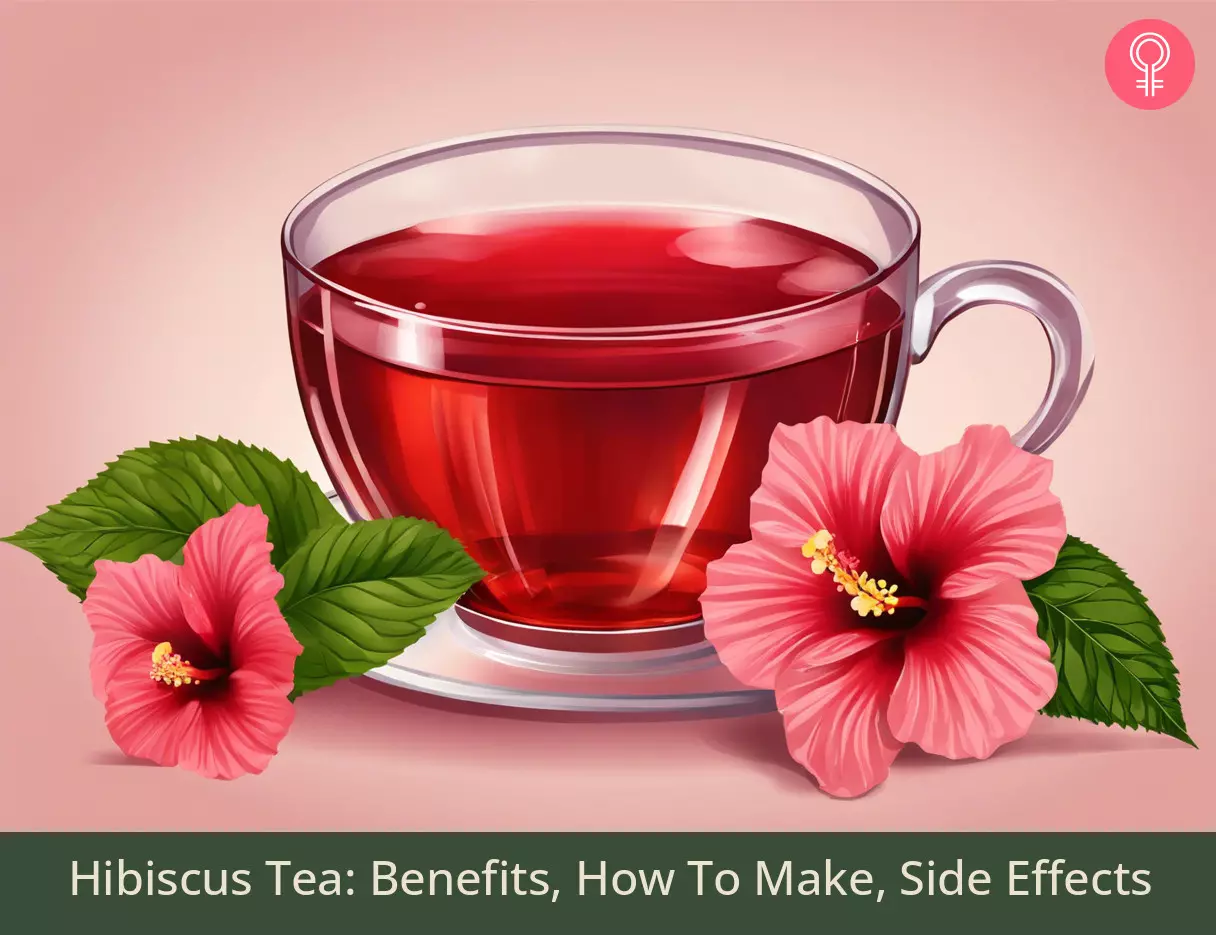
Image: Stable Diffusion/StyleCraze Design Team
References
Articles on StyleCraze are backed by verified information from peer-reviewed and academic research papers, reputed organizations, research institutions, and medical associations to ensure accuracy and relevance. Read our editorial policy to learn more.
- Evaluation of the wound-healing activity of Hibiscus rosa sinensis L (Malvaceae) in Wistar albino rats, Indian Journal of Pharmacology, US National Library of Medicine, National Institutes of Health.
https://www.ncbi.nlm.nih.gov/pmc/articles/PMC3523494/ - Herbal Treatment for Dermatologic Disorders, Herbal Medicine: Biomolecular and Clinical Aspects, National Center for Biotechnology Information.
https://www.ncbi.nlm.nih.gov/books/NBK92761/ - Effect of Hibiscus sabdariffa extract on high fat diet–induced obesity and liver damage in hamsters, Food & Nutrition Research, US National Library of Medicine, National Institutes of Health.
https://www.ncbi.nlm.nih.gov/pmc/articles/PMC4608971/ - Effects of Hibiscus sabdariffa extract powder and preventive treatment (diet) on the lipid profiles of patients with metabolic syndrome (MeSy), Phytomedicine, US National Library of Medicine, National Institutes of Health.
https://pubmed.ncbi.nlm.nih.gov/19962289/ - Hibiscus sabdariffa extract inhibits obesity and fat accumulation, and improves liver steatosis in humans, Food & Function, US National Library of Medicine, National Institutes of Health.
https://pubmed.ncbi.nlm.nih.gov/24549255/ - In vivo and in vitro evaluation of hair growth potential of Hibiscus rosa-sinensis Linn, Journal of Ethnopharmacology, US National Library of Medicine, National Institutes of Health.
https://pubmed.ncbi.nlm.nih.gov/12963149/ - Ethnopharmacological survey of home remedies used for treatment of hair and scalp and their methods of preparation in the West Bank-Palestine, BMC Complementary and Alternative Medicine, US National Library of Medicine, National Institutes of Health.
https://www.ncbi.nlm.nih.gov/pmc/articles/PMC5499037/ - The Effect of Green Tea versus Sour Tea on Insulin Resistance, Lipids Profiles and Oxidative Stress in Patients with Type 2 Diabetes Mellitus: A Randomized Clinical Trial, Iranian Journal of Medical Sciences, US National Library of Medicine, National Institutes of Health.
https://www.ncbi.nlm.nih.gov/pmc/articles/PMC4164889/ - Decrease of Plasma Glucose by Hibiscus taiwanensis in Type-1-Like Diabetic Rats, Evidence-Based Complementary and Alternative Medicine, US National Library of Medicine, National Institutes of Health.
https://www.ncbi.nlm.nih.gov/pmc/articles/PMC3652199/ - Effect of Hibiscus sabdariffa Calices on Dyslipidemia in Obese Adolescents: A Triple-masked Randomized Controlled Trial, Journal of the Academy of Medical Sciences of Bosnia and Herzegovina, US National Library of Medicine, National Institutes of Health.
https://www.ncbi.nlm.nih.gov/pmc/articles/PMC3769081/ - Effects of aqueous extracts of dried calyx of sour tea (Hibiscus sabdariffa L.) on polygenic dyslipidemia: A randomized clinical trial, Avicenna Journal of Phytomedicine, US National Library of Medicine, National Institutes of Health.
https://www.ncbi.nlm.nih.gov/pmc/articles/PMC5787994/ - The Effect of Hibiscus Sabdariffa on Lipid Profile, Creatinine, and Serum Electrolytes: A Randomized Clinical Trial, ISRN Obstetrics and Gynecology, US National Library of Medicine, National Institutes of Health.
https://www.ncbi.nlm.nih.gov/pmc/articles/PMC3168576/ - Hibiscus sabdariffa L. in the treatment of hypertension and hyperlipidemia: a comprehensive review of animal and human studies, Fitoterapia, US National Library of Medicine, National Institutes of Health.
https://www.ncbi.nlm.nih.gov/pmc/articles/PMC3593772/ - Anti-hepatotoxic activities of Hibiscus sabdariffa L. in animal model of streptozotocin diabetes-induced liver damage, BMC Complementary and Alternative Medicine, US National Library of Medicine, National Institutes of Health.
https://www.ncbi.nlm.nih.gov/pmc/articles/PMC4131030/ - Anxiolytic and sedative effects of extracts of Hibiscus sabdariffa Linn (family Malvaceae), African Journal of Medicine and Medical Sciences, US National Library of Medicine, National Institutes of Health.
https://pubmed.ncbi.nlm.nih.gov/18756855/ - High antiviral effects of hibiscus tea extract on the H5 subtypes of low and highly pathogenic avian influenza viruses, The Journal of Veterinary Medical Science, US National Library of Medicine, National Institutes of Health.
https://www.ncbi.nlm.nih.gov/pmc/articles/PMC5059367/ - Antidepressant-like activity of anthocyanidins from Hibiscus rosa-sinensis flowers in tail suspension test and forced swim test, Indian Journal of Pharmacology, US National Library of Medicine, National Institutes of Health.
https://www.ncbi.nlm.nih.gov/pmc/articles/PMC3469946/ - Antidepressant-like effects of methanol extract of Hibiscus tiliaceus flowers in mice, BMC Complementary and Alternative Medicine, US National Library of Medicine, National Institutes of Health.
https://www.ncbi.nlm.nih.gov/pmc/articles/PMC3407014/ - Hibiscus polyphenol-rich extract induces apoptosis in human gastric carcinoma cells via p53 phosphorylation and p38 MAPK/FasL cascade pathway, Molecular Carcinogenesis, US National Library of Medicine, National Institutes of Health.
https://pubmed.ncbi.nlm.nih.gov/15791651/ - The triterpenoids of Hibiscus syriacus induce apoptosis and inhibit cell migration in breast cancer cells, BMC Complementary and Alternative Medicine, US National Library of Medicine, National Institutes of Health.
https://www.ncbi.nlm.nih.gov/pmc/articles/PMC4410586/ - Phytochemical, Pharmacological and Toxicological Aspects of Hibiscus sabdariffa L.: A Review, Phytotherapy Research, US National Library of Medicine, National Institutes of Health.
https://www.academia.edu/6222377/Phytochemical_Pharmacological_and_Toxicological_Aspects_of_Hibiscus_sabdariffa_L._A_Review - Phenolic Compounds in Extracts of Hibiscus acetosella (Cranberry Hibiscus) and Their Antioxidant and Antibacterial Properties
- Post-Coital Antifertility Activity of Hibiscus rosa-sinensis Linn. Roots, Evidence-Based Complementary and Alternative Medicine, US National Library of Medicine, National Institutes of Health.
https://www.ncbi.nlm.nih.gov/pmc/articles/PMC2249740/ - In Vitro Digestibility of Aluminum from Hibiscus sabdariffa Hot Watery Infusion and Its Concentration in Urine of Healthy Individuals, Biological Trace Element Research, US National Library of Medicine, National Institutes of Health.
https://pubmed.ncbi.nlm.nih.gov/27107884/ - Oxidative Stress and Inflammation: What Polyphenols Can Do for Us? Oxidative Medicine and Cellular Longevity, US National Library of Medicine, National Institutes of Health.
https://www.ncbi.nlm.nih.gov/pmc/articles/PMC5055983/ - ANTIOXIDANT LEVELS IN INDIAN ROSE, HIBISCUS, CHRYSANTHEMUM AND MARIGOLD TEA AND THEIR COMPARISON WITH BLACK AND GREEN TEA, International Research Journal Of Pharmacy, Academia
https://www.academia.edu/49495837/Antioxidant_Levels_in_Indian_Rose_Hibiscus_Chrysanthemum_and_Marigold_Tea_and_Their_Comparison_with_Black_and_Green_Tea
Read full bio of Heather M. Duquette-Wolf
Read full bio of Ravi Teja Tadimalla
Read full bio of Arshiya Syeda
Read full bio of Sindhu Koganti







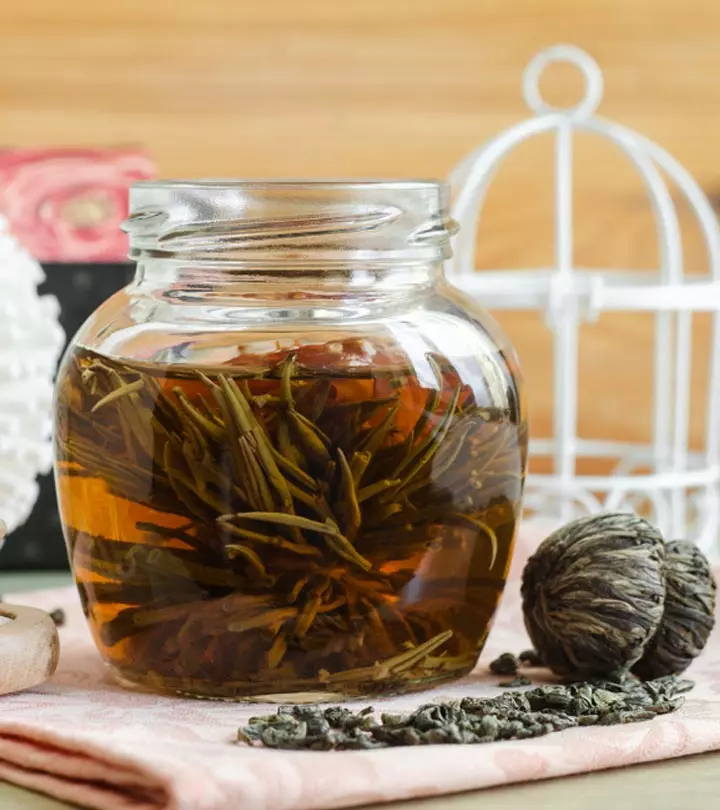
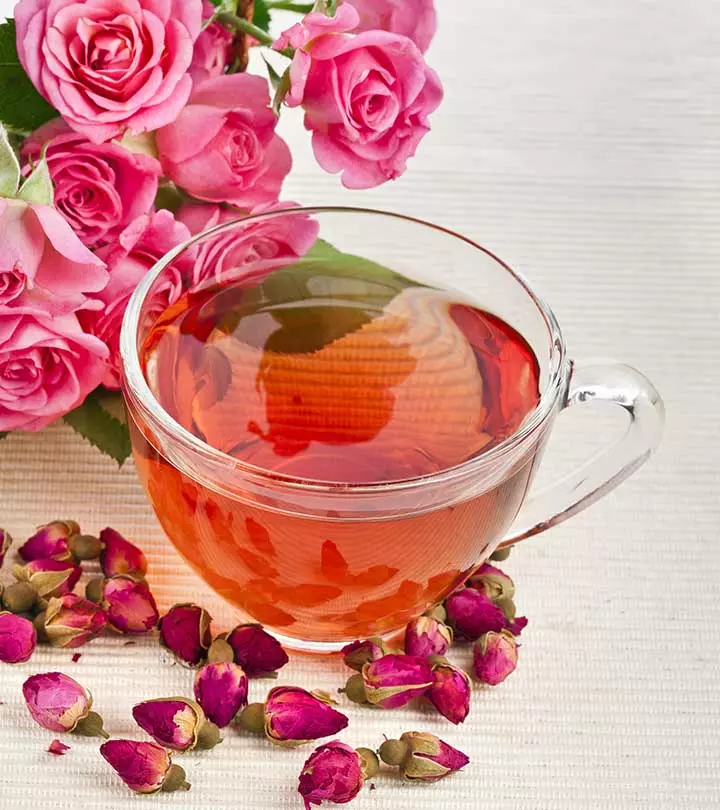
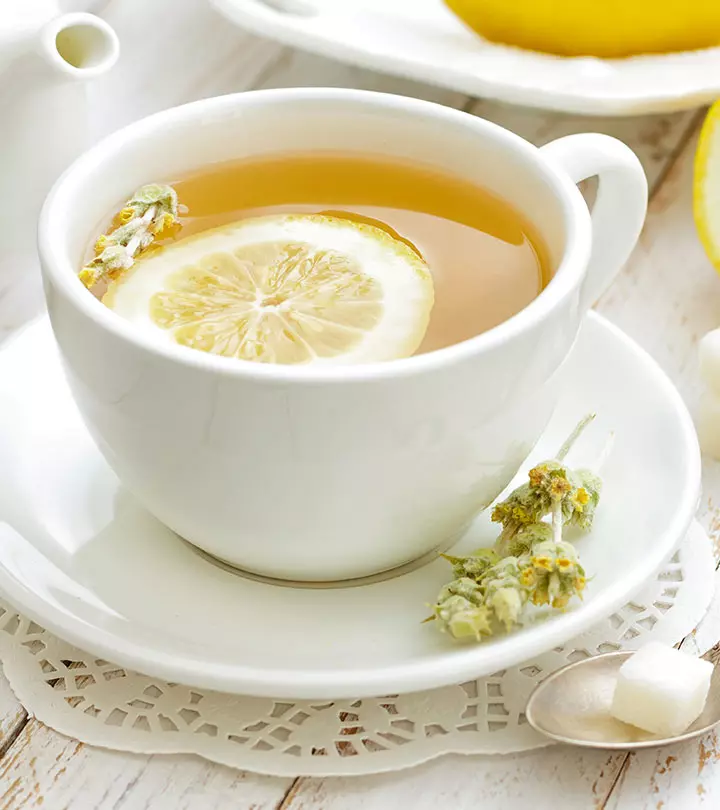
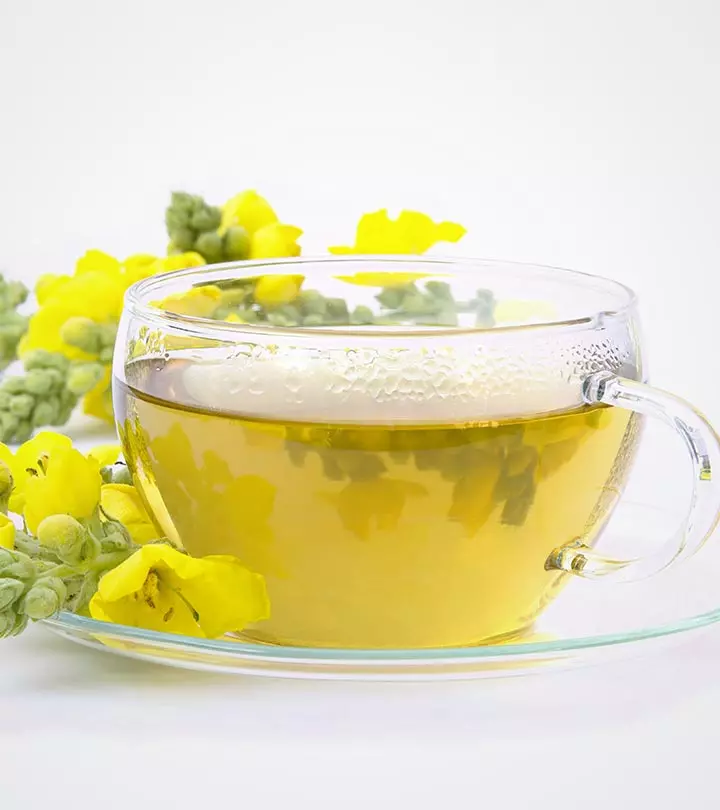
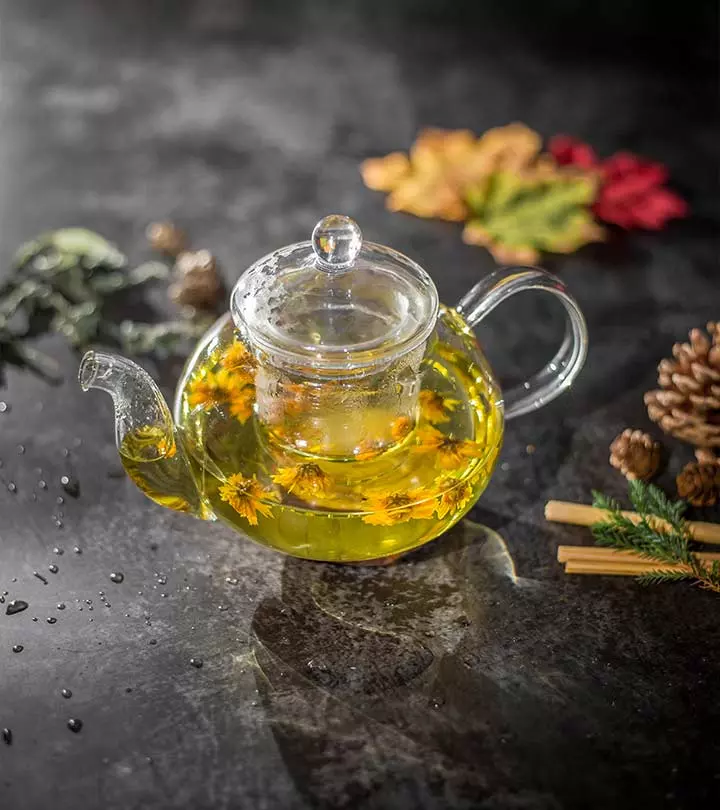
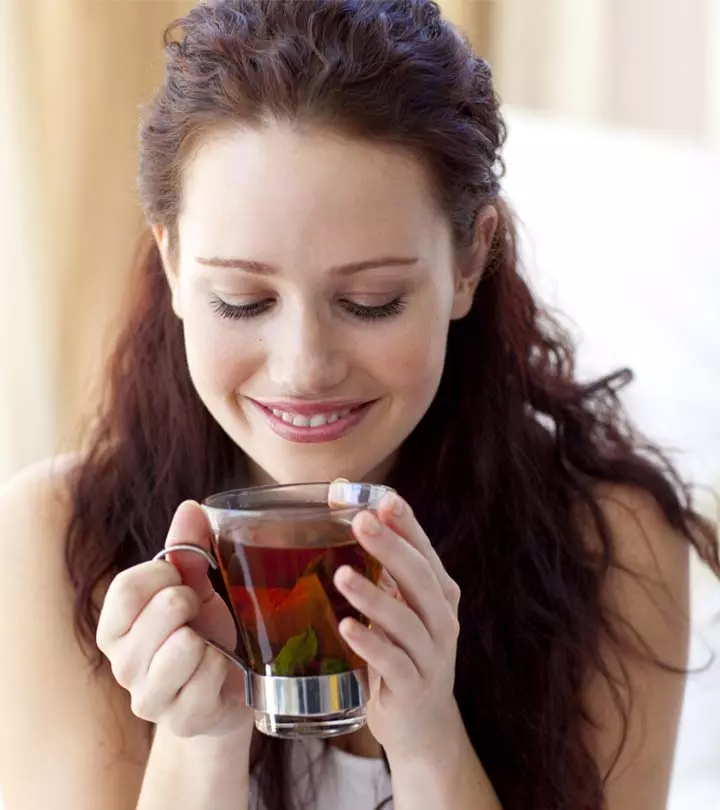
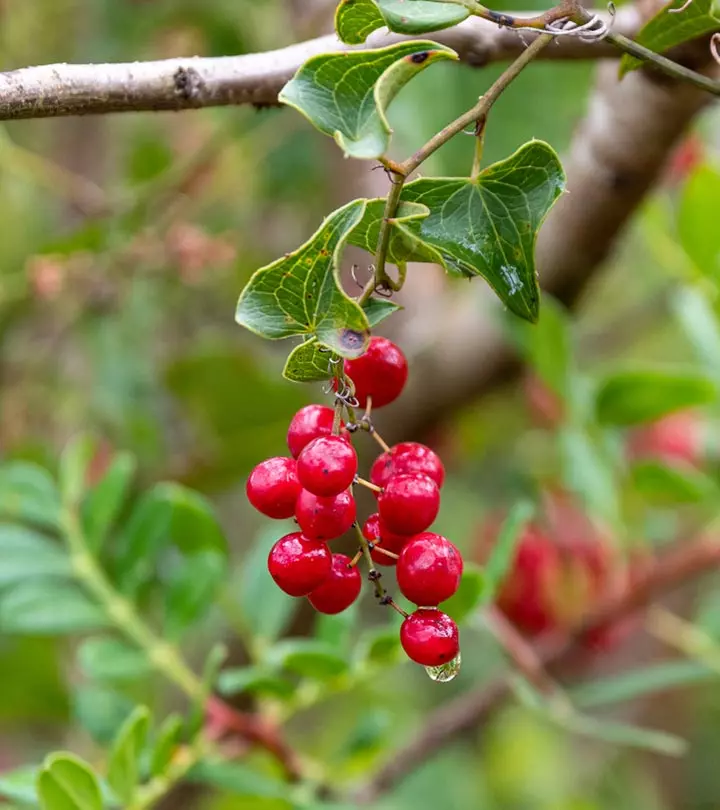
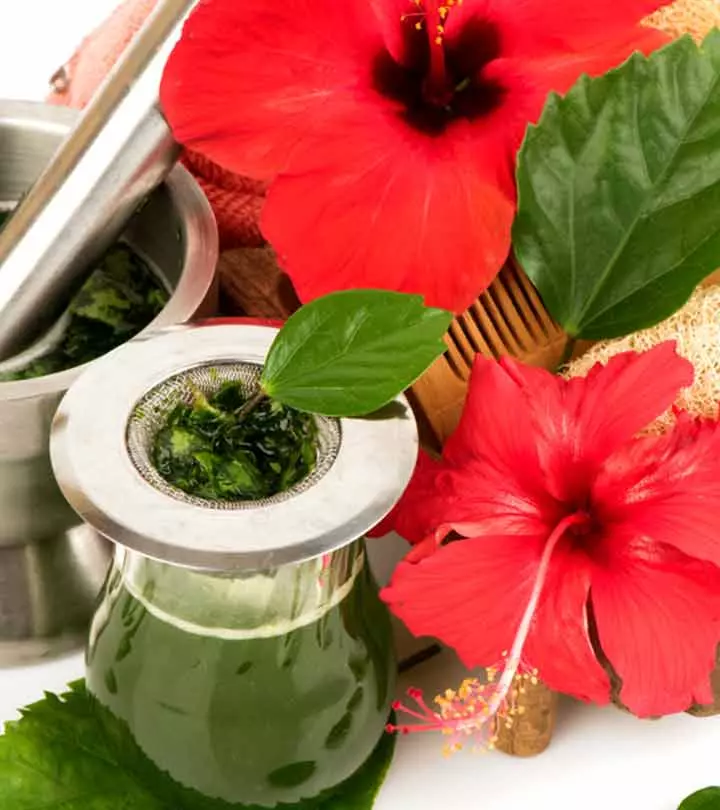
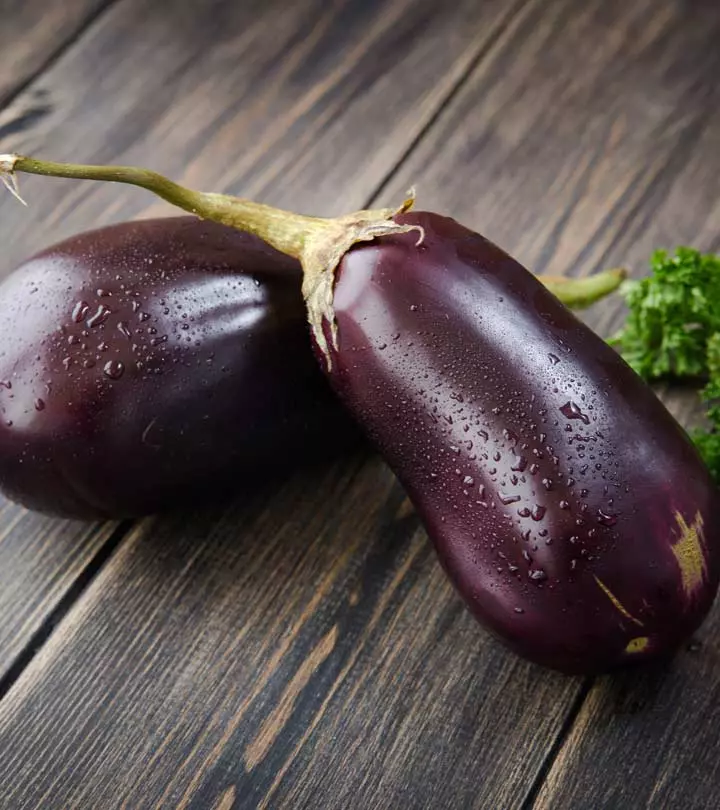
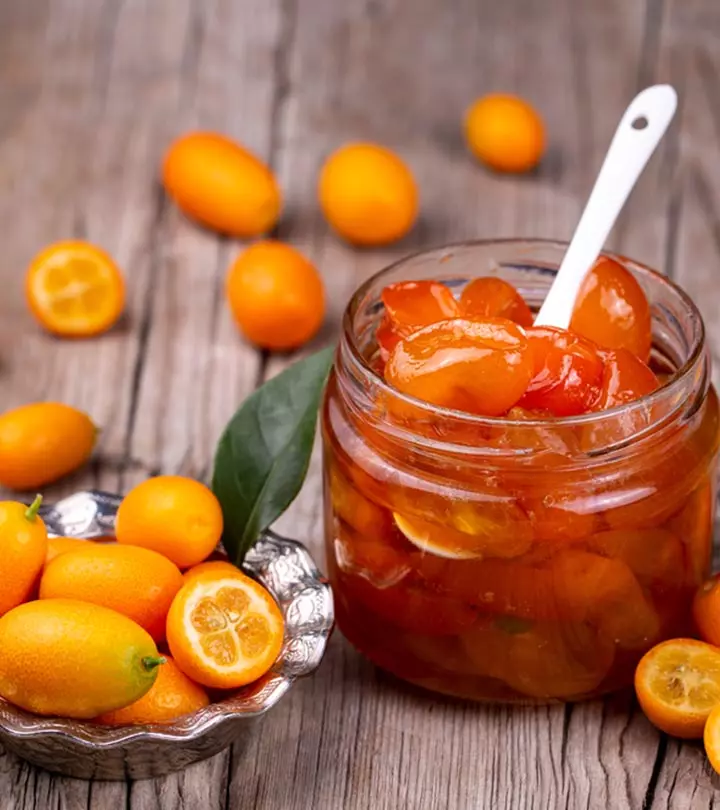
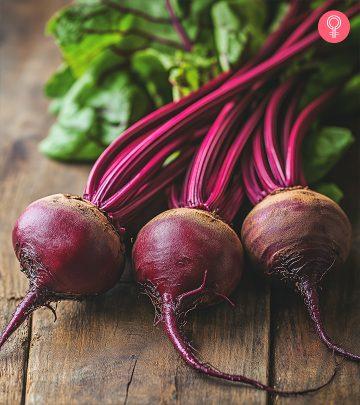
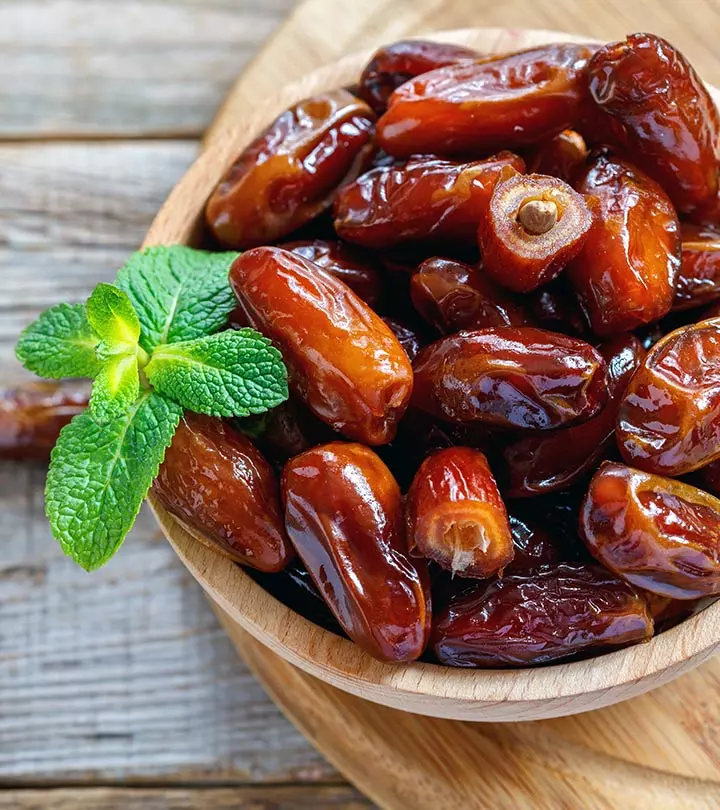
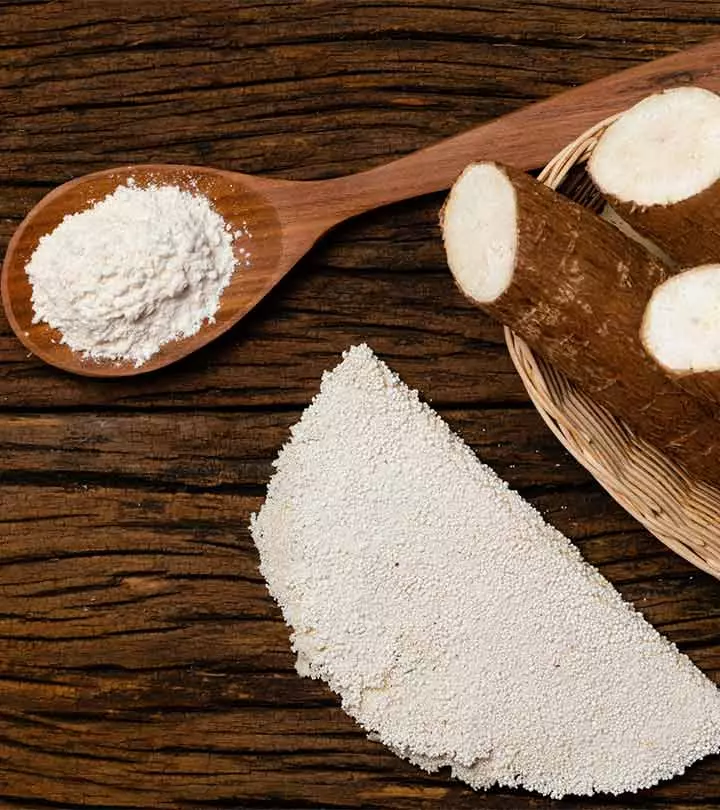
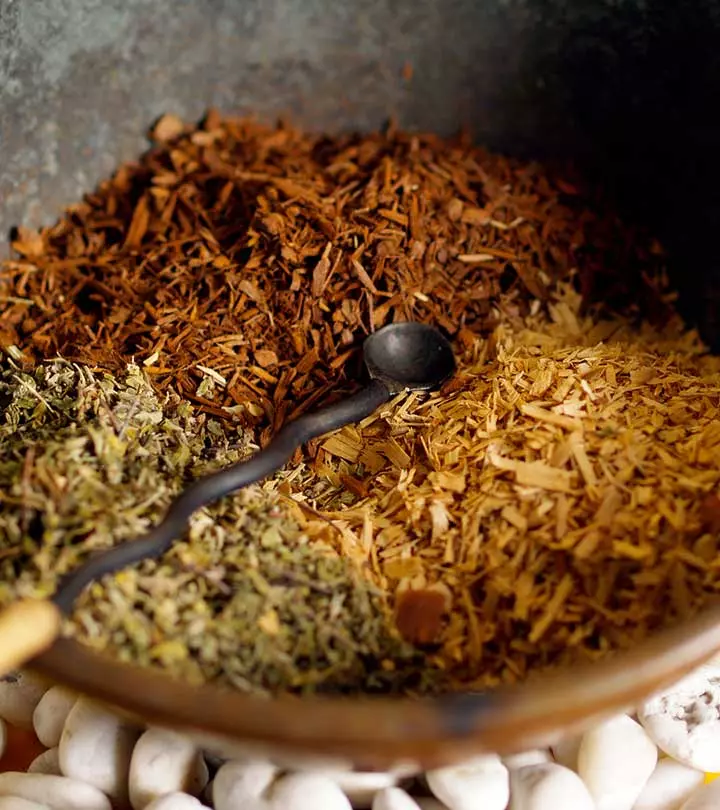
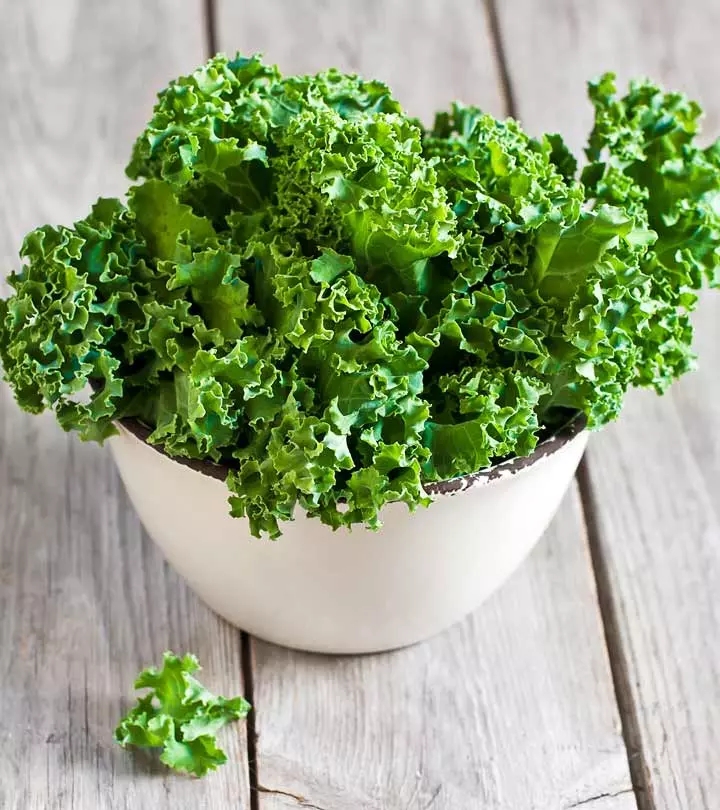
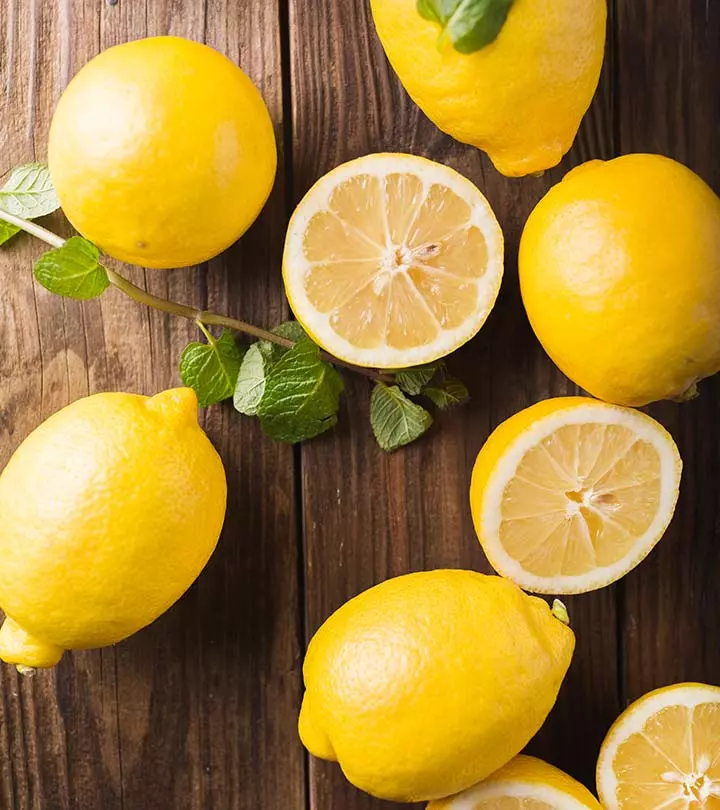
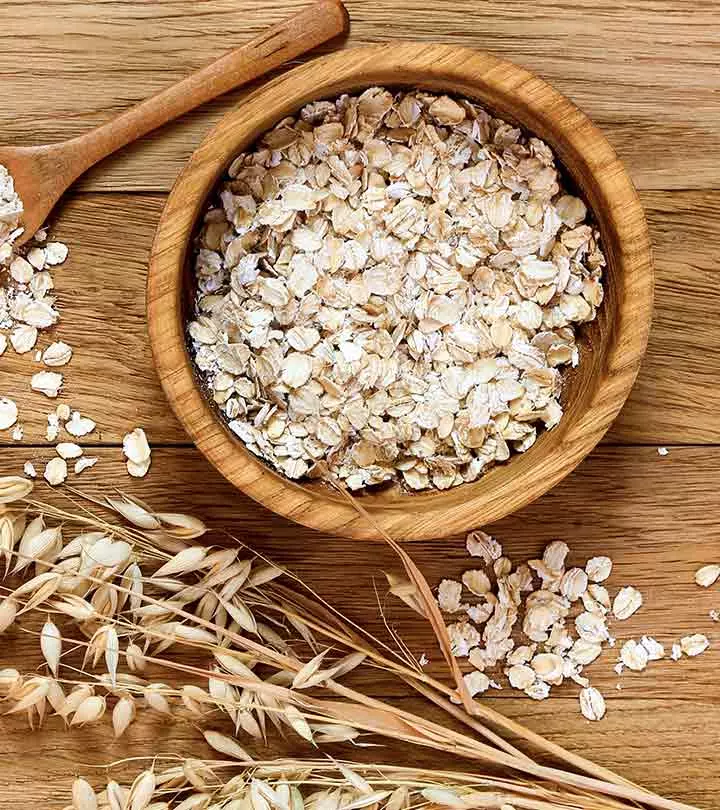
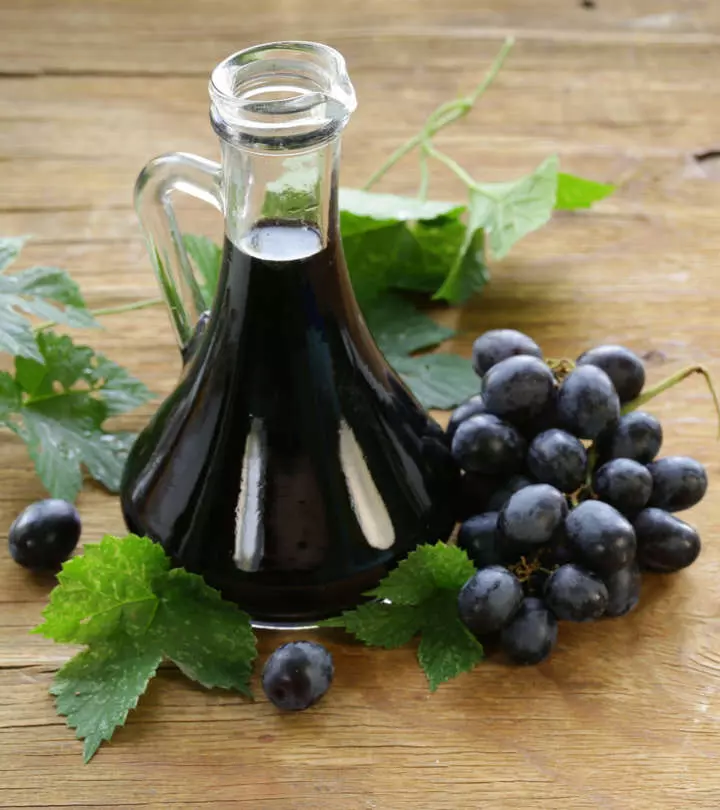
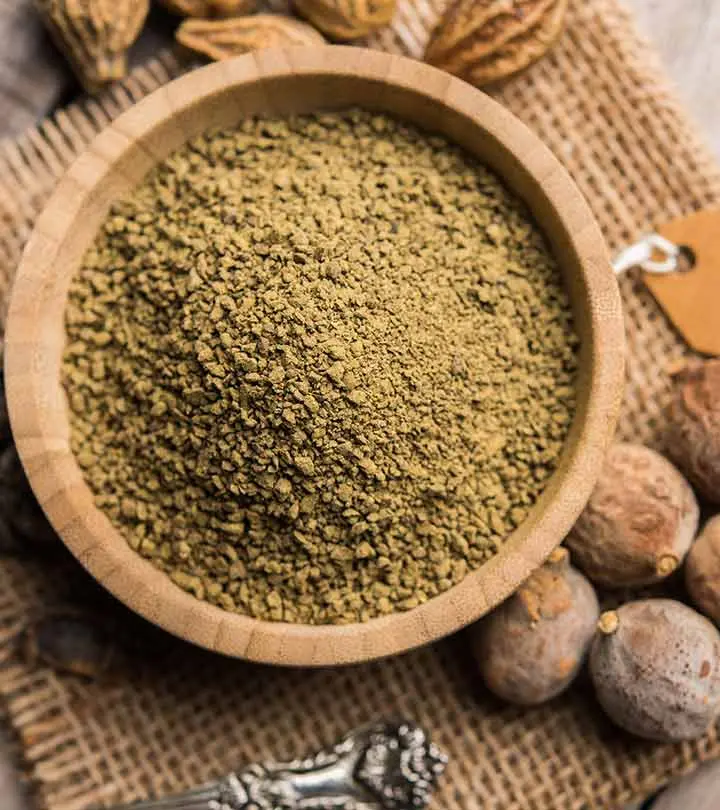
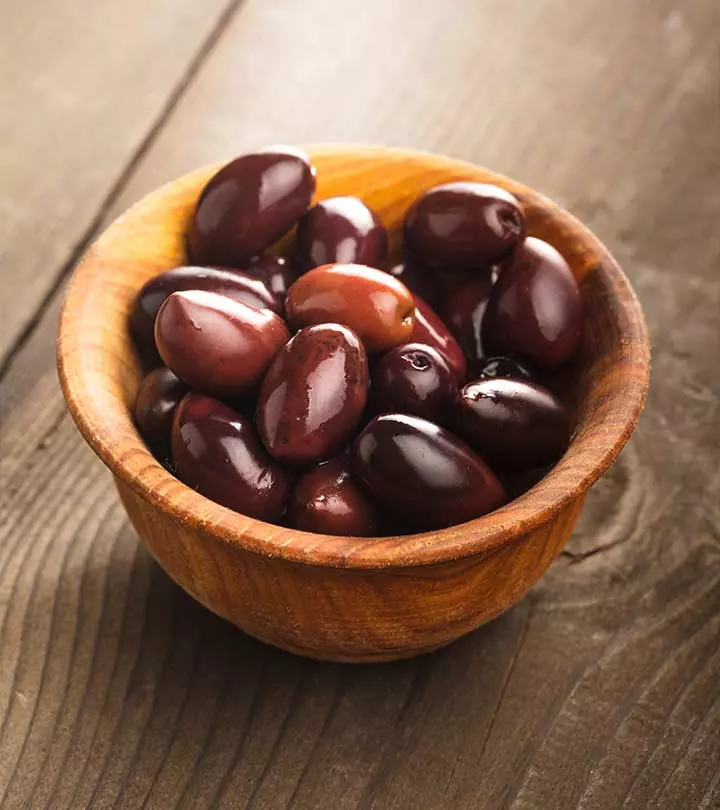
Community Experiences
Join the conversation and become a part of our empowering community! Share your stories, experiences, and insights to connect with other beauty, lifestyle, and health enthusiasts.